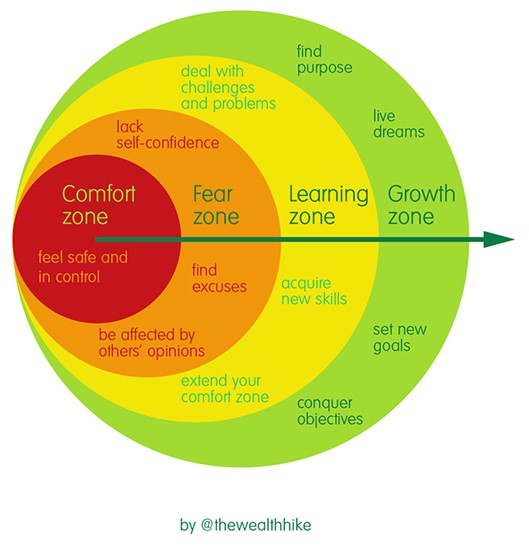Navigating Change with Ease:
How to Embrace the Unknown
With World Mental Health Day fast approaching on Tuesday 10th October 2023, we’re exploring this year’s theme: ‘mental health is a universal human right’.
Our mental health can be impacted and shaped by life’s challenges, many of which take the form of change and how this makes us feel.
With this in mind, we spoke to Lloyd’s Wellbeing Centre practitioner, Karen Liebenguth. With over 15 years of experience as an accredited master coach, life coach, and mindfulness teacher and trainer, Karen has helped countless corporate and private clients thrive, even (and especially) in the face of life’s many challenges. In this blog post she explains how you can stop being apprehensive or anxious about change for good and learn to welcome its impact on your life.
Karen is starting her practice at the Lloyd’s Wellbeing Centre in November 2023 and is looking forward to helping you navigate life’s challenges.

Developing as a person means being willing to be open to change and to relax into it, knowing that change is an intrinsic part of life – that change is life itself.
We live in a hugely dynamic world. Sometimes change happens suddenly, e.g., with the onset of the pandemic, and sometimes change is slower paced and more difficult to discern. But things change – continuously and consistently – in each and every one of our lives: at work, at home, and all around us.
Most of Us Resist Change – Why is That?
I used to feel very fearful about change, and for many years, I lived with a constant undercurrent of anxiety. This was not only tiring, but it also held me back from living my life fully. Change can feel uncomfortable, scary, even. We like to hang on to what is known and familiar. We like to stay in our comfort zones because they’re safe, they give us security, and they protect us from failure and rejection – the very things many of us fear most.

Resisting change can feel like swimming against the stream. It takes effort and energy.
It’s this fear of the unknown – fear of losing control, fear of falling apart, fear of losing our jobs, fear of losing status, fear of losing loved ones, fear of failure, fear of our own potential, and fear of rejection – that leads us to resist change. Yet change is an intrinsic part of life.
Resisting change takes effort and energy. It’s a bit like swimming against the stream. Resisting the flow of life is what causes us the most suffering.
There are broadly two tendencies with which we resist change:
- Blocking
When something difficult happens, e.g., a deadline, a conflict with a colleague, or a financial issue, we block the difficult emotions, such as anxiety, anger, frustration, or fear, by suppressing or pushing them away. - Overwhelm
When a challenging situation arises, like a health issue or an important presentation at work, we go into over-thinking mode. We over-identify with it and become the challenge we are facing. As a result, we feel overwhelmed, and our world feels narrow. We become completely wrapped up in the difficulty in front of us.
What is Your Tendency towards Resisting Change?
It’s helpful to begin to notice what your tendency is to resist change. What are some of your typical behaviours you slip into to avoid facing up to what’s going on beneath the surface? It often happens automatically, and often before we know it, we’re on auto-pilot: we binge eat, drink, or watch Netflix, keep looking at our phones, work more than we should, or simply go to bed instead. We become stuck in our habitual and unhelpful ways of dealing with challenges and change.
It’s a paradox. When something unpleasant happens, we intuitively want to push it away. But it’s the very opposite that needs to happen. When we feel anxious or overwhelmed, and we want to feel calm and confident, we need to feel the emotion, i.e., the anxiety or fear, in the body, and turn towards it with kindness and care. It’s the very attitude that we would bring to a colleague, a loved one, or a friend who was having a tough time.
Attitude Matters
Being kind and caring doesn’t mean being nice and indulgent by letting ourselves off the hook. Neuroscience tells us that people who practice kindness to the self and others are more emotionally robust because they don’t go into negative thinking and self-deprecation when they make a mistake or encounter a stressful situation.
So, what and how we pay attention to something matters a very great deal because it creates our experience, our lives, and our reality. It is the attitude we choose to adopt towards the world: absent, present, open, curious, kind, detached, engaged, alienated, aversive, empathic, broad, narrow, or sustained.
Therefore, attention and our attitudes have the power to change whatever they meet for the better or worse.
The Conundrum of Life
On the one hand, we resist change to feel safe and secure in our comfort zones. On the other hand, we also want to thrive, have a purpose in life, grow, learn and develop, or make a contribution to something bigger than ourselves via our job, voluntary work, caring for someone, being a trustee for a charity, or raising a family.
How Does Change Happen?
When we understand how change happens, it becomes easier to relax into it and go with the flow of change. The secret to embracing change is practising self-kindness, curiosity, and open-heartedness while taking small steps. If we take steps which are too big too quickly, we get fearful, as you can see in the diagram below. This fear undermines our confidence, and we go into avoiding and resisting mode by finding excuses not to do something differently.
The first step is to face up to our fear of change. It’s normal and human. We need to reassure ourselves that we can do it and wisely choose supporters who will encourage us. This can help us move through the fear zone with confidence and courage.
The second step is to be open to learning, to adopt a learning mindset vs a failure mindset, and to see change or challenge as an opportunity to get interested in what you can learn about yourself, others, and the situation (whether it’s work or something else).
The third step is to be open to growth, which often happens organically once we’ve adapted a learning mindset and opened up to life. Opening up to life takes us into the flow of life. We begin to swim with the stream.

To Thrive vs to Survive
The purpose of life is hence to thrive, be active, explore, learn new things, and expand our comfort zones into ever-widening circles. Developing as a person means being willing to be open to change and to relax into it, knowing that change is an intrinsic part of life – that change is life itself.

Embracing change is the key to personal growth. It’s about facing new opportunities with confidence and courage.
If we are too rigid in life, too stuck in our comfort zones, we’ll find ourselves in danger of suppressing an inherent need to grow and learn as a person, which in turn can cause us to begin to experience low mood, anxiety, and even depression.
Living with an undercurrent of anxiety not only impacted my overall mood and sleep – it affected the choices I made or didn’t make.
Some years ago, my mentor, a wise woman, said to me: “What would happen if you relaxed into your experience as it is and went with the flow of change that is already happening?” All of a sudden, I could truly relax and let go of resisting change. I understood – not just in my head – but in my body and heart too – that everything is changing all the time, inside me and beyond me.
How Can We Embrace Change?
When we turn towards change and relax into it, life becomes meaningful. The meaning comes from making the effort to expand our comfort zone and turn towards our fear.
Here are some tips to help you to turn towards change:
- Listen to your feelings when you go through change
Pause, breathe, and become aware of how you feel about the change that is happening. Are you feeling scared, frustrated, annoyed, or perhaps overwhelmed? Remind yourself that it’s okay to feel like this. Just sit and acknowledge how you feel without wanting to get rid of the uncomfortable or difficult feelings or allowing yourself to become overwhelmed by them. - Be willing to negotiate with your resistance to change – taking small and manageable steps is the secret to reaching your destination
Listen to the part of you that feels resistant – this is generally the part of us that feels fearful. Ask yourself: “What am I resisting?”, i.e., “What do I not want to happen?”. Often, the answer is, “I don’t want to lose control”, “I don’t want to fail”, or “I don’t want people to judge me”. You can reassure yourself by asking: “How do I know that people will judge me or not like me anymore?” or “How likely is it that I will fail?” .Listen to what you need in times of change and stretch yourself in a way that feels manageable to you. It’s okay to take small steps to explore new territory outside your comfort zone. - Develop a support system

Building a support system can make navigating change easier. Surround yourself with trusted allies who understand your journey.
Have other people with whom you can share the ups and downs of change. A trusted colleague, mentor, or close friend. We don’t have to do it all alone. Choose people who you know well, who have your best interests at heart, and who you know will listen to you – perhaps someone who has experienced or is going through similar changes right now.
Navigating Change – A Closing Note
It’s not change that causes us suffering; it’s our resistance to change that holds us back from living fully – from finding meaning in life. Change is life itself, and we all have the capacity to learn to turn towards change with awareness and kindness, as well as trust in ourselves and life. Embracing change sets you free from fear and allows you to thrive and flourish.
Make an appointment with Karen
World Mental Health Day serves as a reminder that we all need to do whatever we can to take care of our own mental wellbeing. At the Lloyd’s Wellbeing Centre, we’re excited to be offering our clients appointments with Karen, who can provide you with life coaching and executive coaching sessions that support your personal and professional growth. She’s looking forward to helping you on your journey towards a calmer, more purposeful life.
At 1 PM on Wednesday 25th October 2023, Karen will also be leading a talk at the Lloyd’s Wellbeing Centre, all about “Navigating Change with Ease: How to Embrace the Unknown”.
It’s free and everyone is welcome – no Lloyd’s pass required.







